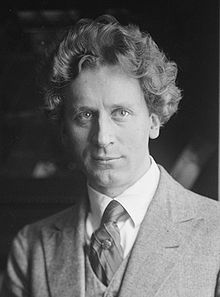In the course of a long and innovative career Percy Grainger played a prominent role in the revival of interest in British folk music in the early years of the 20th century. He also made many adaptations of other composers' works. Although much of his work was experimental and unusual, the piece with which he is most generally associated is his piano arrangement of the folk-dance tune "Country Gardens".
WIKIPEDIA
VIDEO: 1999 biopic examining the life and career of the Australian-born musician best known as a concert pianist, arranger of folk tunes (e.g. Country Gardens, Brigg Fair) and his often bizarre musical inventions. He is lesser known as a self-flagellant with controversial sexual mores. His mother Rose is played by Barbara Hershey.

Light music is orchestral music, which originated in the 19th century and continues until the present day. The style is a less "serious" form of Western classical music, featuring usually shorter orchestral pieces of mood music or concert music. Light music is often grouped with 'Easy Listening". On our stations playlist you will hear a mix of instrumental light music and excerpts from traditional forms of music. (beautifulmusic.uk, beautifulinstrumentals.com and classicalmusic.network)
the music
Before Late Romantic orchestral trends of length and scope separated the trajectory of lighter orchestral works from the Western Classical canon, classical composers such as Wolfgang Amadeus Mozart or Joseph Haydn won as much fame for writing lighter pieces such as Eine Kleine Nachtmusik as for their symphonies and operas. Later examples of early European light music include the operettas of composers such as Franz von Suppé or Sir Arthur Sullivan; the Continental salon and parlour music genres; and the waltzes and marches of Johann Strauss II and his family. The Straussian waltz became a common light music composition (note for example Charles Ancliffe's "Nights of Gladness" or Felix Godin's "Valse Septembre"). These influenced the foundation of a "lighter" tradition of classical music in the 19th and early 20th centuries...from the likes of Binge and Coates to Farnon.
Labels
- ACQUAVIVA Tony
- ADDINSELL Richard
- ADDISON John
- ADES David
- ALFORD Kenneth J
- Amazon CDs/MP3
- ANCLIFFE Charles
- ANDERSON Leroy
- BAYCO Frederic
- BAYNES Sydney
- BBC
- BINGE Ronald
- BLACK Stanley
- BUCALOSSI Ernest
- BUCALOSSI Procida
- CESANA Otto
- COATES Eric
- COLERIDGE-TAYLOR Samuel
- COLLINS Anthony
- COLLINS Walter
- CURZON Frederic
- DENNIS John
- DOCKER Robert
- DOUGLAS Johnny
- DUNCAN Trevor
- EILENBERG Richard
- ELLIS Vivian
- EWING Montague
- FALL Leo
- FARNON Dennis
- FARNON Robert
- FINCK Herman
- FLETCHER Percy
- FOULDS John
- FRIML Rudolf
- GERARD Paul
- GIBBS Cecil Armstrong
- GOODWIN Ron
- GRAINGER Percy
- GREEN Harry Philip
- GUILD LIGHT MUSIC
- HEDGES Anthony
- HERBERT Victor
- JOHNSON Laurie
- LANGFORD Gordon
- LEWIS Paul
- MACDOWELL Edward
- MAWER Anthony
- Medley
- MORLEY Angela
- MYERS Sherman
- PEARSON Johnny
- RICKETTS Frederick Joseph
- ROSE David
- Schwartz Solomon
- STEVENS Len
- STOTT Wally
- TAYLOR
- TORCH Sidney
- WAYNE Bernie
- WHITE Edward
